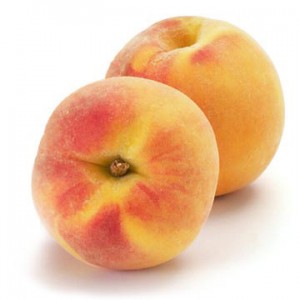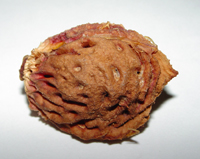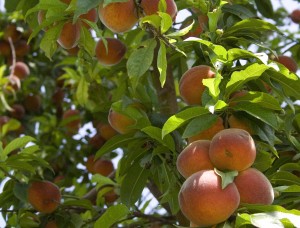 The other day I was visiting a friend and she had the most beautiful peach tree in the backyard. It grew enormous, sweet peaches—I ate three of them after we had lunch. I asked her which nursery she had bought the tree from and she said that she actually grew it herself—from a peach pit! She offered me one of the discarded pits from lunch and told me that if I wanted to grow a tree too, she would tell me what to do and help me whenever I needed it. I gladly accepted, anticipating an abundant supply of those divine peaches.
The other day I was visiting a friend and she had the most beautiful peach tree in the backyard. It grew enormous, sweet peaches—I ate three of them after we had lunch. I asked her which nursery she had bought the tree from and she said that she actually grew it herself—from a peach pit! She offered me one of the discarded pits from lunch and told me that if I wanted to grow a tree too, she would tell me what to do and help me whenever I needed it. I gladly accepted, anticipating an abundant supply of those divine peaches.
Her instructions were to take the peach pit home and bury it in a small pot. Give it plenty of water and sunlight. When the seedling gets to be about 6 inches high, plant it in a bigger pot. When it reaches 2 feet, transplant it outside where it will receive lots of sunlight and water. It seems like a lot more work and a lot more time than I originally counted on. I decide to…
 A. Throw the seed out the car window as I am driving home and resolve to just come by her house occasionally and ask for a bushel of peaches. (Go to {A})
A. Throw the seed out the car window as I am driving home and resolve to just come by her house occasionally and ask for a bushel of peaches. (Go to {A})
B. Take it home and plant it outside in the spot where I am eventually going to put it in the yard and save myself a few steps. (Go to {B})
C. Take it home and plant it in the small pot and water it faithfully for a few days. At least, as long as it’s still interesting to me. (Go to {C})
D. Take it home and do exactly as she says. (Go to {D})
{A} As I throw the seed out of my window, I think—how would I know if this particular peach pit was even going to germinate? I’m pretty sure it was faulty. If she asks, I’ll just say it never came up, so would she mind just sharing her peaches once in a while? I just saved myself a lot of trouble. Unfortunately, my friend moves away the following year and my peach supply ends. (Matthew 13: 4, 19).
{B} I take the seed home and wonder if it is even a viable peach pit—will it germinate? Or did she just get lucky with her peach pit? Maybe she wasn’t even telling me the truth about growing her pit into a tree! I talk to a lot of my friends about it, we look stuff up on Wikipedia about peaches and what the likelihood is of them germinating. I go to cherry growers websites, too (they are also stone fruits), to see if they have hints or facts about growing peaches. I discuss it with people in the supermarket line. I’m getting a lot of good information about peaches and I think I’m almost an expert on them. I guess the time is right for me to have my own.
I decide just to plant it in the yard and see if it comes up. I’m not going to bother with all the fussy details. I plant it and, mercifully, the rain and sun cooperate. One day as I’m out playing with my toddler in the yard, I notice a little seedling unfolding in the sun–the peach tree! The only problem is that it is surrounded by thick Texas grass and weeds. I check on it occasionally, but after a few weeks, the grass and weeds have won the battle for water and sun and the seedling is gone. Hmm, I guess I should have just planted it inside like she said. Turns out it was a good pit. Unfortunately, my friend moved away before peach season came again and I didn’t get another chance to try it. (Matthew 13: 7, 22)
{C} As I leave her house, I am so excited and empowered by the idea that I could grow my very own peach tree! I’m going to start a blog about it! I’m going to take pictures every day to show the progress! And maybe I will be able to find a little ruler that I can plant right along with the pit and then I can tell how much it is growing every day. What should I name it? Tabitha. Definitely Tabitha. Full of adrenaline, I rush right in and find a small pot (my first attempt at ceramics in 9th grade), fill it with potting soil and plant the seed. I faithfully water it for a week. Then less faithfully the next week. Then we go on vacation for three days. When I get home, I have kind of forgotten about it and it never really gets to be part of my daily schedule, besides, now I am too busy teaching myself Tae Kwon Do from YouTube tutorials. Two months later, as I do the dishes, I look up and see it there. Brown and lying in the dirt. The sun and drought has fried it. Poor Tabitha. I just got really busy. (Matthew 13: 5, 20-21; Alma 32: 38-40)
grow my very own peach tree! I’m going to start a blog about it! I’m going to take pictures every day to show the progress! And maybe I will be able to find a little ruler that I can plant right along with the pit and then I can tell how much it is growing every day. What should I name it? Tabitha. Definitely Tabitha. Full of adrenaline, I rush right in and find a small pot (my first attempt at ceramics in 9th grade), fill it with potting soil and plant the seed. I faithfully water it for a week. Then less faithfully the next week. Then we go on vacation for three days. When I get home, I have kind of forgotten about it and it never really gets to be part of my daily schedule, besides, now I am too busy teaching myself Tae Kwon Do from YouTube tutorials. Two months later, as I do the dishes, I look up and see it there. Brown and lying in the dirt. The sun and drought has fried it. Poor Tabitha. I just got really busy. (Matthew 13: 5, 20-21; Alma 32: 38-40)
{D} As I leave her house, I am excited about the possibility of having my own peach tree, growing right out my back door. I already have a pot on my window sill with some dirt in it from another plant that didn’t survive the winter. Maybe this tree will be luckier. I decide to empty the old dirt out and put in some fresh, moist potting soil. The kind with MiracleGro right in it. This little pit needs all the help it can get. Then I put it back up on the windowsill and remind myself that every time I make dinner, I will give it a little drink. As soon as it is part of my schedule, it is easy to take care of. My kids and I watch the little sprout grow and grow with fascination.
After a few months, we put it in a bigger pot and it continues to grow. It only takes a year and a half to be hardy enough to plant outside. A year and a half! And now we’ll have fresh peaches each summer for the rest of our lives, if I continue to care for it. I’d say it was a solid investment of time. Good thing I did, too, because my friend moves away the next year and her peach tree is razed when the new owners take over the house. We still talk about gardening stuff on the phone though. It’s so great to have that in common. As soon as my tree starts producing, I plan to send her a peach pit so she can grow her own again. This particular variety is sweeter than any other I’ve tasted. (Matthew 13: 8,23; Alma 32: 28-37).

If you are wondering what in the world I am talking about, read Alma 32: 28-43 and Matthew 13. A gospel-centered life is a lot sweeter than peaches. I know that it is viable and will germinate if you give it a sincere chance with diligent effort. You can know the restored Gospel of Jesus Christ is true fairly quickly (a sprout), but to be able to stand on your own testimony takes a little time (say, a year and a half of dedicated effort) and finally receiving the fruit (a life changed through Jesus Christ) can take even longer, though I promise that it is worth the effort.
“And because of your diligence and your faith and your patience with the word in nourishing it, that it may take root in you, behold, by and by ye shall pluck the fruit thereof, which is most precious, which is sweet above all that is sweet, and which is white above all that is white, yea, and pure above all that is pure; and ye shall feast upon this fruit even until ye are filled, that ye hunger not, neither shall ye thirst. Then, my friends, ye shall reap the rewards of your faith and your diligence, and patience, and long-suffering, waiting for the tree to bring forth fruit unto you.” (Alma 32: 42-43)




 The other day I was visiting a friend and she had the most beautiful peach tree in the backyard. It grew enormous, sweet peaches—I ate three of them after we had lunch. I asked her which nursery she had bought the tree from and she said that she actually grew it herself—from a peach pit! She offered me one of the discarded pits from lunch and told me that if I wanted to grow a tree too, she would tell me what to do and help me whenever I needed it. I gladly accepted, anticipating an abundant supply of those divine peaches.
The other day I was visiting a friend and she had the most beautiful peach tree in the backyard. It grew enormous, sweet peaches—I ate three of them after we had lunch. I asked her which nursery she had bought the tree from and she said that she actually grew it herself—from a peach pit! She offered me one of the discarded pits from lunch and told me that if I wanted to grow a tree too, she would tell me what to do and help me whenever I needed it. I gladly accepted, anticipating an abundant supply of those divine peaches. A. Throw the seed out the car window as I am driving home and resolve to just come by her house occasionally and ask for a bushel of peaches. (Go to {A})
A. Throw the seed out the car window as I am driving home and resolve to just come by her house occasionally and ask for a bushel of peaches. (Go to {A}) grow my very own peach tree! I’m going to start a blog about it! I’m going to take pictures every day to show the progress! And maybe I will be able to find a little ruler that I can plant right along with the pit and then I can tell how much it is growing every day. What should I name it? Tabitha. Definitely Tabitha. Full of adrenaline, I rush right in and find a small pot (my first attempt at ceramics in 9th grade), fill it with potting soil and plant the seed. I faithfully water it for a week. Then less faithfully the next week. Then we go on vacation for three days. When I get home, I have kind of forgotten about it and it never really gets to be part of my daily schedule, besides, now I am too busy teaching myself Tae Kwon Do from YouTube tutorials. Two months later, as I do the dishes, I look up and see it there. Brown and lying in the dirt. The sun and drought has fried it. Poor Tabitha. I just got really busy. (
grow my very own peach tree! I’m going to start a blog about it! I’m going to take pictures every day to show the progress! And maybe I will be able to find a little ruler that I can plant right along with the pit and then I can tell how much it is growing every day. What should I name it? Tabitha. Definitely Tabitha. Full of adrenaline, I rush right in and find a small pot (my first attempt at ceramics in 9th grade), fill it with potting soil and plant the seed. I faithfully water it for a week. Then less faithfully the next week. Then we go on vacation for three days. When I get home, I have kind of forgotten about it and it never really gets to be part of my daily schedule, besides, now I am too busy teaching myself Tae Kwon Do from YouTube tutorials. Two months later, as I do the dishes, I look up and see it there. Brown and lying in the dirt. The sun and drought has fried it. Poor Tabitha. I just got really busy. (
